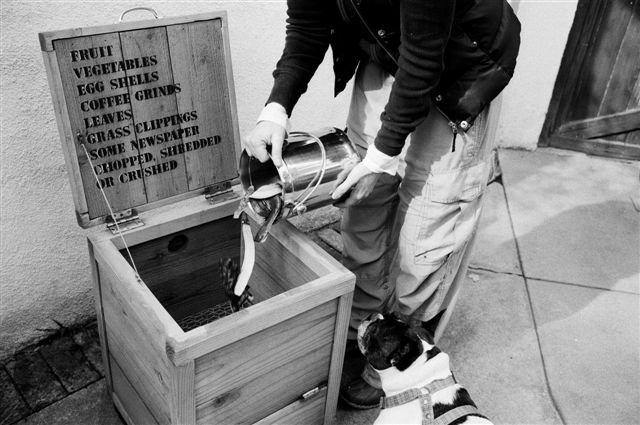Composting has been part of global culture since ancient times. In today's world home composting diverts in upwards of 700 lbs of material per household annually. Not only is composting an effective and excellent way to reduce waste in landfills, but it also produces high quality soil amendment. To shed some light on home composting, I turned to Priscilla Woolworth, who avidly composts, and asked her a few basic questions on how to get started. She designed the Valentina, a beehive-inspired wood composter, which is made in the USA. If Priscilla's last name sounds familiar, it will more than likely be from jaunts made long ago to the neighborhood Woolworth's five-and-dime store. The last store closed in 1997, however Priscilla carries on the family legacy with her eco-friendly monthly almanac and online store.

Photo: PriscillaWoolwoth.com
Why compost?
Composting is brilliant because you are reducing waste by turning your produce waste into rich organic matter for your garden.
Is composting complex?
Like anything new, once you get the hang of it, it's really very easy.
What do you put in your Valentina Composter?
Kitchen scraps: peelings and choppings of fruit and vegetables, except citrus, eggshells, coffee grinds, shredded newspaper, bits of cardboard and all manner of rotten fruit and veggies are especially welcome.
What is required to achieve the best results?
You need to start with a balanced mix of newspaper, soil, and compostable materials. I also recommend worms as they really speed up the composting process.
What advice do you have for squeamish people who associate a gross factor with composting?
Most of us are sensitive to the yuck factor, but when you get started it isn't gross...yet. As long as you monitor your composter regularly, nothing unpleasant should happen.
What role does the sun play?
The sun is important because it helps heat up the compost, which then makes it warm, and the materials start breaking down faster. Just don't let it get too hot.
Should composting be done in the shade?
Composting can be done in the sun or the shade. The only difference is it will take a lot longer in the shade and the worms may not like it if it's too chilly.
Is there anything that should not be added to the compost?
All meats and bones, dairy except eggshells, citrus and cat litter, cooked vegetables, salad dressings or sauces.
You wrote in your blog about San Francisco implementing a mandatory
composting law. Do you think most cities will follow suit?
It would be wonderful if all cities followed San Francisco's lead and encouraged people to live a less wasteful lifestyle and composting is an effective way to reducing waste.
What tips do you have for composting in different climates?
You can compost in any climate, though some are easier than others. If you live in a cold climate, and you have an outdoor composter, it's vital that you keep it warm and insulated with straw bales and cardboard. Or you can just dig a hole in the ground and let the earth do the work.
